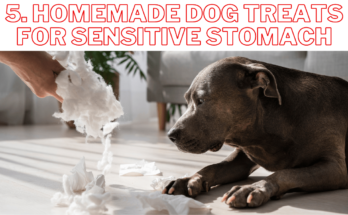A golden opportunity to de-stress your furry friend with natural dog anxiety remedies’
Introduction:
Dogs, being our loyal and loving companions, sometimes face problems similar to those faced by humans. One of the most common issues that dogs experience is anxiety, which can be triggered by various factors such as separation, loud noises, or unfamiliar surroundings. As a pet owner, seeing your beloved friend in distress can be heartbreaking, and finding ways to ease their anxiety becomes a top priority.
While there are medications available to treat anxiety in dogs, many pet owners prefer to look first for holistic and natural remedies, which are gentle and effective in reducing their dog’s anxiety. In this comprehensive guide, we will explore a variety of natural remedies for dog anxiety, including insights, tips, and even some recipes to help your canine companion feel more relaxed and comfortable.
We will discuss various natural remedies such as essential oils, herbs, and supplements that can help soothe your dog’s anxiety. We will also provide helpful tips on how to create a calming environment for your dog, such as playing soothing music or creating a cozy den for them to relax in.
Finally, we understand that your dog is a beloved member of your family, and we want to assure you that we will pray for their well-being. With the tips and remedies in this guide, we hope that your furry friend will be able to overcome their anxiety and live a happy and calm life with you.
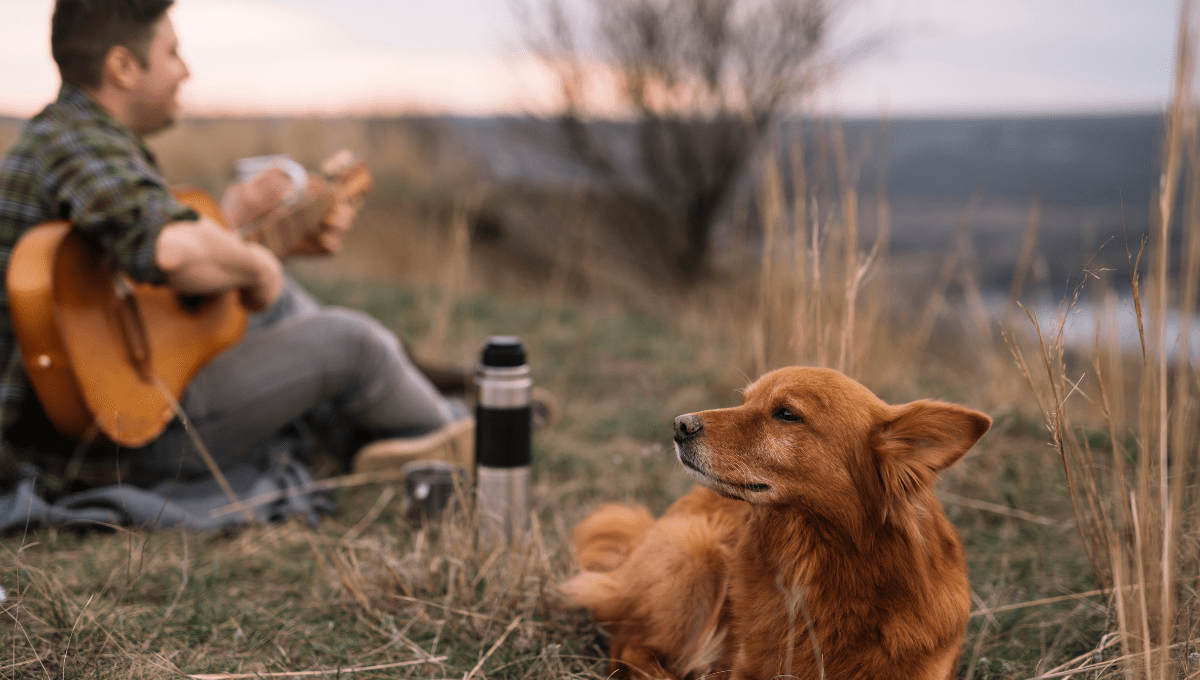
Understanding Dog Anxiety: What Causes It?
1. Anxiety in dogs can come from a variety of sources, including:
Separation anxiety is a common condition seen in dogs, where they may become anxious or stressed when left alone for extended periods. Similarly, loud noises like thunder or fireworks can cause Noise Phobia in some dogs, leading to anxiety-related behaviors. Dogs that have experienced traumatic events or abuse in the past may also exhibit anxiety-related behaviors. Additionally, a change in environment such as moving to a new home or traveling to unfamiliar places can also trigger anxiety in sensitive dogs.
2. Identifying Signs of Anxiety in Your Dog.
When dogs feel anxious, they can display a variety of behaviors. One common sign of anxiety is nervous pacing or restlessness. Another indication of anxiety is excessive barking or whining, as dogs may seek reassurance through vocalization. In some cases, dogs may exhibit destructive behaviors such as chewing on furniture or digging when they are feeling anxious. Additionally, if a dog is panting excessively or hopping around, it could be a sign that they are experiencing stress or anxiety. It’s important to pay attention to these behaviors and seek professional help if you believe your dog is struggling with anxiety.
Read About: Homemade dog treats for sensitive stomach
Natural Remedies for Dog Anxiety: Exploring Your Options.
CBD Oil: A Calming Solution.
Derived from the hemp plant, CBD oil has gained popularity for its calming effects on both humans and pets. It interacts with the endocannabinoid system to promote relaxation and reduce anxiety levels in dogs. Giving your dog CBD oil calms their nerves and promotes a sense of calm.
Herbal Remedies: Harnessing the Power of Nature.
Herbs such as chamomile, valerian root, and passion flower have natural soothing properties that help relieve dogs’ anxiety. These herbs can be brewed as a tea or tincture and added to your dog’s food or water. Incorporating herbal remedies into your dog’s daily routine can provide gentle relief from anxiety without the need for pharmaceutical intervention.
Aromatherapy: Calming Scents for Anxious Dogs.
As a pet parent, you might have noticed that your furry friend can get anxious pretty easily. Fortunately, there are some natural ways to help calm your dog down, and aromatherapy with essential oils is one of them. Essential oils are concentrated plant extracts that have been used for centuries to promote relaxation and relieve stress in humans, and they can have similar effects on dogs.
Some essential oils that are known for their calming properties include lavender, chamomile, and frankincense. These oils have a soothing aroma that can help reduce anxiety, promote relaxation, and even improve sleep quality in dogs. You can diffuse these oils in the air using a diffuser or apply them topically to your dog’s collar or bedding to create a calming environment.
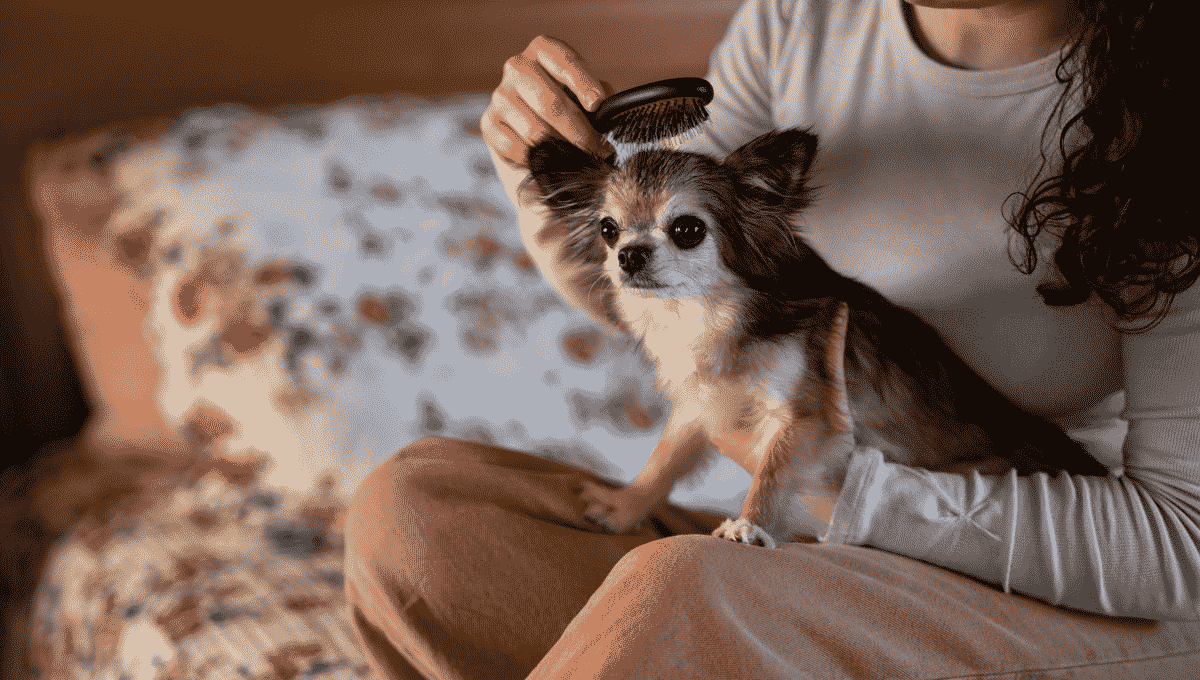
Massage Therapy: Bonding Through Touch.
Massage therapy can be a highly effective and safe technique for reducing anxiety in dogs, and can also help strengthen the bond between you and your furry friend. By gently massaging your dog, you can help relax their tense muscles, improve blood circulation, and promote feelings of calm and security.
Not only does massage therapy offer physical benefits, such as reducing muscle tension, promoting flexibility, and improving overall well-being, but it can also offer emotional benefits. Spending quality time massaging your dog can help relieve feelings of anxiety and create a sense of trust and closeness between you and your pet.
Additionally, massage therapy can be particularly helpful for dogs that suffer from conditions such as arthritis, hip dysplasia, or other musculoskeletal disorders. By gently manipulating their muscles and joints, massage can help alleviate pain, reduce stiffness, and improve mobility.
It’s worth noting that before starting any massage therapy, it’s always best to consult with your veterinarian to ensure that it’s safe for your dog. With the right techniques and care, massage therapy can be a wonderful way to enhance your dog’s overall health and happiness.
Exercise and Mental Stimulation: Keeping Your Dog Balanced.
Taking care of your furry friend’s physical and emotional health is crucial to ensure they lead a happy and fulfilling life. Engaging your dog in regular exercise and mental stimulation activities is an excellent way to promote their overall well-being. Brisk walks, jogs, or runs, depending on your dog’s breed and size, are great for burning off excess energy and maintaining their physical fitness.
These activities also help to reduce stress and anxiety levels in dogs, leading to a more relaxed and contented pet. Mental stimulation activities such as interactive games and puzzle toys also play a vital role in keeping your dog’s mind sharp and engaged. These activities are particularly crucial for breeds that have a high energy level or are prone to anxiety and boredom.
Incorporating daily exercise and stimulation activities into your dog’s routine can help them build mental energy, reduce destructive behavior, and promote better sleep. So, make sure to prioritize regular exercise and mental stimulation for your furry friend and watch them thrive!
Dietary Changes: Nourishing Your Dog’s Body and Mind.
As a pet owner, it’s crucial to understand the importance of diet for your furry friend’s health and well-being, including their emotional stability. By feeding your dog a high-quality and balanced diet that is rich in essential nutrients, you can support their immune system, reduce inflammation, and promote a healthy gut microbiome.
It’s also worth noting that some ingredients can have a calming effect on dogs, helping to reduce anxiety and promote relaxation. For instance, adding foods like turkey, sweet potatoes, and pumpkin to your dog’s regular meals can help calm their nerves and soothe their digestive system.
Turkey is a great source of tryptophan, which can help regulate serotonin production, a neurotransmitter that plays a vital role in mood regulation. Sweet potatoes are rich in dietary fiber, vitamins, and antioxidants, which can help reduce inflammation and promote better digestion. Meanwhile, pumpkin is another excellent source of dietary fiber and can help regulate bowel movements, reducing constipation and other digestive issues.
By incorporating these ingredients into your dog’s diet, you can help support their emotional well-being and overall health. Additionally, it’s always a good idea to consult with your veterinarian to determine the best dietary plan for your furry friend’s specific needs.
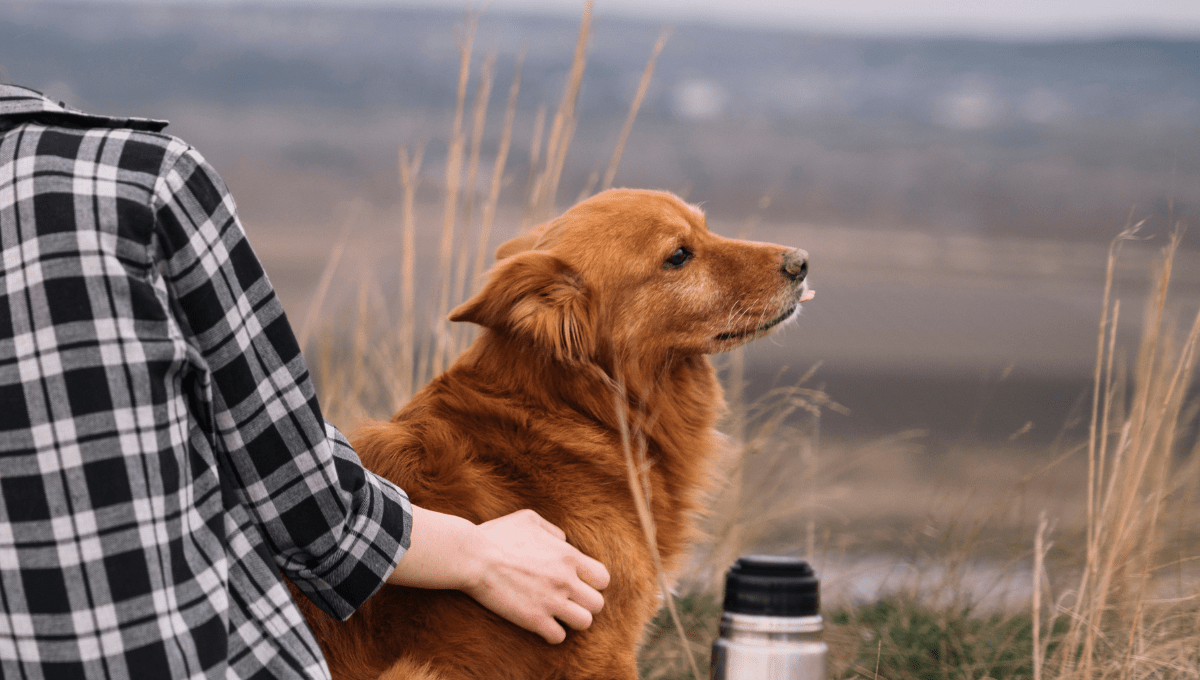
Mindfulness and Relaxation Techniques: Finding Inner Peace.
Stress and anxiety are common problems that affect both humans and dogs. Practicing mindfulness and relaxation techniques can be an effective way to manage these issues. These techniques involve being present in the moment, focusing on your breath, and quieting your mind. Some examples of relaxation techniques include deep breathing, progressive muscle relaxation, and guided imagery.
Deep breathing exercises involve taking slow, deep breaths and exhaling slowly. This can help reduce tension and promote relaxation in both you and your dog. Progressive muscle relaxation involves tensing and relaxing different muscle groups in your body, which can help release tension and stress. Guided imagery involves visualizing calming scenes or experiences, which can help promote a sense of calm and relaxation.
You can also adapt these techniques for use with your dog. For example, you can practice deep breathing exercises with your dog by sitting together and taking deep breaths while petting your dog. You can also try progressive muscle relaxation by gently massaging your dog’s muscles and then releasing the tension.
Spending quiet, quality time together can also help promote relaxation and strengthen your bond with your dog. This can involve simply sitting together and enjoying each other’s company, going for a walk, or engaging in other calming activities.
By practicing mindfulness and relaxation techniques with your dog, you can help reduce stress and anxiety and promote a sense of calm and relaxation for both you and your furry friend.
Creating a Safe and Comfortable Environment: Minimizing Triggers.
As a pet owner, it is your responsibility to ensure that your dog feels safe and comfortable in your home. Anxiety is a common issue that many dogs face, and it is important to manage it in a way that is both effective and humane. To minimize anxiety triggers, it is essential to keep your dog away from loud noises and sudden changes in routine as much as possible. You can also provide your furry friend with a designated “safe space” where they can retreat when feeling anxious.
This space should be filled with familiar toys, bedding, and comforting scents that your dog associates with safety and security. Additionally, you can consider using calming pheromone diffusers or calming vests to help reduce anxiety during stressful situations. These products can be especially helpful during situations such as thunderstorms or fireworks, which can cause extreme anxiety in some dogs. By taking these steps, you can create a safe and comfortable environment for your furry friend, helping them to feel happy and healthy in their home.
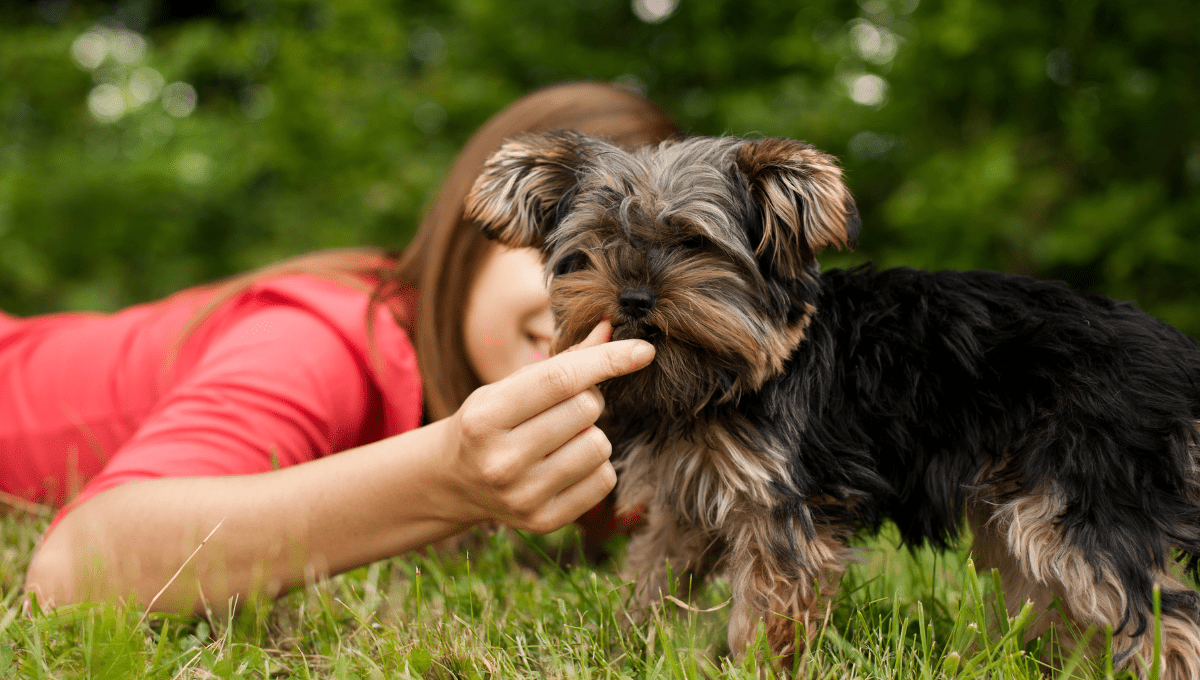
Positive Reinforcement: Encouraging Calm Behavior.
Using positive reinforcement techniques can help encourage calm behavior in your dog and reinforce relaxation cues. Reward your dog with treats, praise, or toys when they exhibit calm behavior, such as lying quietly or sitting calmly. Avoid inadvertently reinforcing anxious behaviors by remaining calm and composed, even during stressful situations.
Holistic Therapies: Exploring Alternative Approaches.
In addition to conventional treatments, many holistic therapies can help alleviate anxiety in dogs. Acupuncture, massage therapy, and chiropractic care are just a few examples of holistic modalities that can promote relaxation and reduce stress levels in dogs. Consult with a qualified holistic veterinarian to explore alternative approaches to managing your dog’s anxiety and improving their overall well-being.
Seeking Professional Help: When to Consult a Veterinarian.
While natural remedies can be effective for mild to moderate cases of anxiety, severe anxiety may require professional intervention. If your dog’s anxiety significantly impacts their quality of life or daily functioning, it’s essential to consult with a veterinarian. A veterinarian can perform a thorough evaluation, rule out any underlying medical conditions, and recommend appropriate treatment options, including medication, behavioral therapy, or a combination of both.
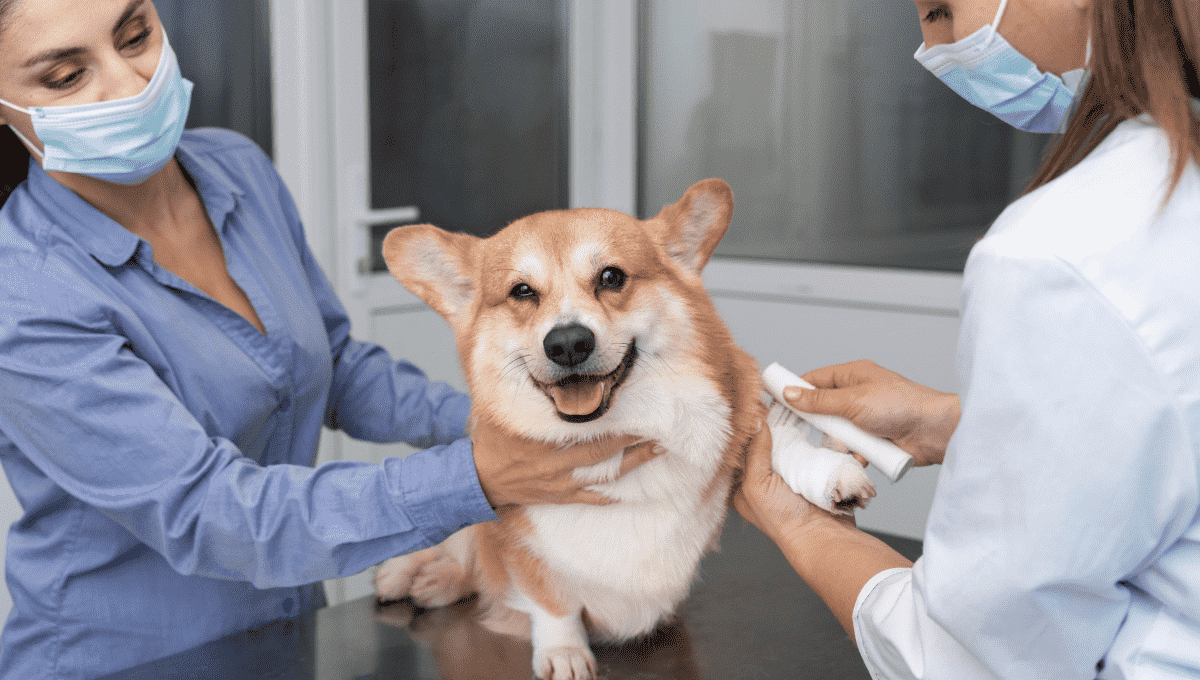
Natural Remedies to Try.
When it comes to calming your anxious pup, natural remedies can be incredibly effective. Here are some gentle and holistic approaches to consider
New Recipes to Calm Your Pup.
In addition to natural remedies and creating a calming environment, incorporating calming ingredients into your dog’s diet can further help alleviate anxiety. Here are some new recipes to try:
1. Turkey and Sweet Potato Biscuits.
Ingredients: Ground turkey, sweet potatoes, oat flour, eggs
Instructions: Mix ingredients, shape into biscuits, and bake until golden brown.
Benefits: Turkey is rich in tryptophan, an amino acid that promotes relaxation, while sweet potatoes are gentle on the stomach.

2. Rice and Chicken Balls.
Ingredients: Cooked rice, shredded chicken breast, carrots, peas
Instructions: Combine ingredients, form into balls, and cook until heated through.
Benefits: Rice is easily digestible and can help soothe upset stomachs, while chicken provides lean protein.

3. Pumpkin and Oatmeal Cookies.
Ingredients: Canned pumpkin, rolled oats, cinnamon, honey
Instructions: Mix ingredients, spoon onto baking sheet, and bake until firm.
Benefits: Pumpkin is high in fiber and can aid in digestion, while oatmeal is a natural stress reliever.

4. Salmon and Quinoa Treats.
Ingredients: Canned salmon, cooked quinoa, spinach, olive oil
Instructions: Blend ingredients, roll into balls, and refrigerate until firm.
Benefits: Salmon is rich in omega-3 fatty acids, which have anti-inflammatory properties and can help reduce anxiety.

FAQs (Frequently Asked Questions)
Here are some common questions about natural remedies for dog anxiety:
Are natural remedies safe for all dogs?
Yes, natural remedies can be safe for most dogs when used appropriately. However, it’s essential to consult with your veterinarian before introducing any new supplements or treatments, especially if your dog has underlying health conditions or is taking medications.
How long does it take for natural remedies to work?
The effectiveness of natural remedies can vary from dog to dog. Some dogs may experience immediate relief, while others may require several days or weeks of consistent use before seeing results. Patience and consistency are key when using natural remedies for dog anxiety.
Can I use natural remedies in conjunction with medication?
It’s essential to consult with your veterinarian before combining natural remedies with medication. Some supplements may interact with certain medications, so it’s crucial to ensure they are safe to use together.
Are there any side effects of using natural remedies?
While natural remedies are generally safe, some dogs may experience mild side effects such as gastrointestinal upset or lethargy. Monitor your dog closely for any adverse reactions and discontinue use if necessary.
How often should I administer natural remedies?
The frequency of administration will depend on the specific remedy and your dog’s individual needs. Follow the recommended dosage instructions provided by the manufacturer or consult with your veterinarian for guidance.
Conclusion:
To help your furry friend feel more relaxed and calm, it’s important to take a gentle and natural approach. This involves using things like natural remedies, creating a calming environment, and trying out different treats. By doing this, you can reduce your dog’s anxiety and improve their overall well-being. It’s also important to make sure you’re giving your pup plenty of love and attention and to stay in touch with your vet.


